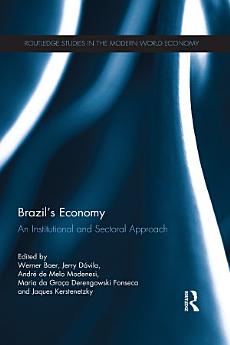Brazil’s Economy: An Institutional and Sectoral Approach
About this ebook
This comprehensive text explores the institutional and sectoral structure of the Brazilian economy through a collection of new case studies, examining how key institutions work within Brazil’s specific economic, political and cultural context. Offering a long-term evolutionary perspective, the book explores Brazil’s economic past in order to offer insights on its present and future trajectory. The contributions gathered here offer fresh insights into representative sectors of Brazil’s economy, from aerospace to software, television, music and banking, paying particular attention to sectors that are likely to drive future growth. Chapters include questions about the roles of foreign and state capital, changes in market regulation, the emergence of new technologies, the opening of markets, institutional and organizational frameworks, and changing management paradigms.
When examined together, the contributions shed light not only on Brazilian business history, but also on the country as a whole. Brazil’s Economy: An Institutional and Sectoral Approach offers fascinating reading for anyone with an interest in: Latin American Economics; the business history of the region; and in doing business in present-day Latin America.
About the author
Jerry Dávila is Jorge Paulo Lemann Professor of Brazilian History and Director of the Lemann Institute for Brazilian Studies at the University of Illinois at Urbana-Champaign, USA.
André de Melo Modenesi
is Associate Professor at the Instituto de Economia at Universidade Federal do Rio de Janeiro, Brazil.Maria da Graça Derengowski Fonseca
is Associate Professor at the Instituto de Economia, Universidade Federal do Rio de Janeiro, Brazil.Jaques Kerstenetzky
is Associate Professor at the Instituto de Economia, Universidade Federal do Rio de Janeiro, Brazil.Werner Baer was Jorge Paulo Lemann Professor of Economics at the University of Illinois at Urbana-Champaign, USA.







